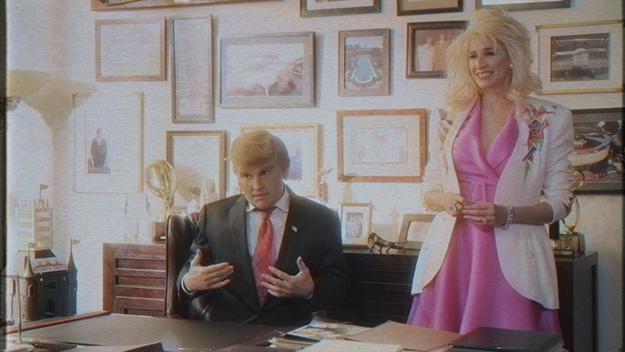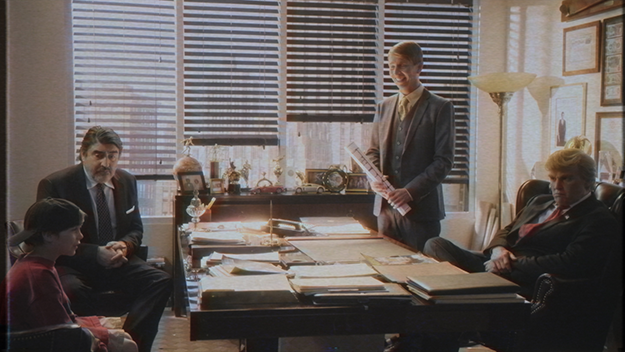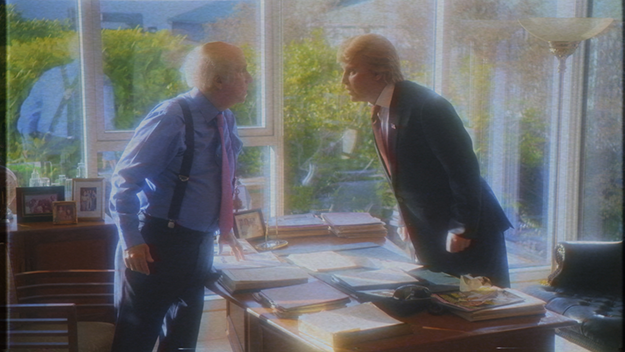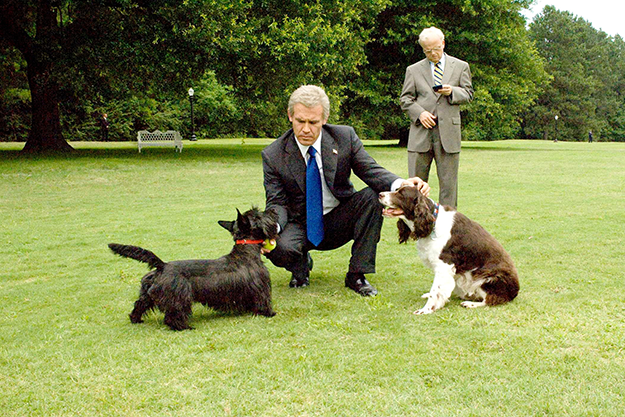Donald Trump's The Art of the Deal: The Movie + W.

Donald Trump’s The Art of the Deal: The Movie
Comedy needs politics, and politics needs comedy. There’s no point in belaboring the boon that election years offer in terms of entertainment. As the personalities have gotten bigger (and, for conservative politicians, are now apparently gaffe-proof), the manner in which they’re lampooned has also outgrown mere SNL sketches and impersonations.
Following Donald Trump’s win at the New Hampshire caucus, last week Funny or Die presented the “lost” 50-minute adaptation of his 1987 memoir/self-help/business book Trump: The Art of the Deal, titled Donald Trump’s The Art of the Deal: The Movie. Written by former Onion editor Joe Randazzo, directed by Drunk History impresario Jeremy Konner, and starring a lumpy latex-enhanced Johnny Depp as Trump, this satire (not “mockumentary” as Ian Crouch refers to it in a hand-wringing pan for the New Yorker) fully embodies the Trump aesthetic and the best of American comedic sensibilities.
None of the biographical information is invented, but nothing is played totally straight. Repeating the mixed metaphor of its source, Donald Trump’s The Art of the Deal: The Movie is divided into chapters that frame his various business pursuits (which, as the film reveals, were mostly achieved by his lawyers rather than one-on-one negotiations) and “trump cards of success”—fortune cookie-calibre business advice (like “fight back!” and “know your market”) that punctuate his dealings with a screaming guitar riff. For dramatic conflict, this adaptation has its own sub-Citizen Kane spin: the fictional Trump attempts to realize his childhood dream of owning the Taj Mahal—the hideous (and currently ailing) Atlantic City casino originally built by Merv Griffin (Patton Oswalt).

Donald Trump’s The Art of the Deal: The Movie
In keeping with the already self-aggrandizing nature of the book and his subject’s propensity to put his name on anything, the film credits all departments—directing, editing, casting, producing, lighting, etc.—to Trump. That may be a gag, but the “classy” production values do have the stream-of-consciousness feel of a one-man megalomaniacal effort. Despite the multi-camera setup, reenactments, and postproduction effects, there are certain scenes that don’t seem to be scripted, or get no retakes: the kid who stumbles into Trump’s office and is the recipient of his wisdom—i.e., the dramatic excuse to brag about his shady dealings—gets recast several times, without any attempt to hide it. (The first boy gets the boot after suggesting he put salsa on a Trump steak, “outing” himself as Latino; he burns through Asian, Middle Eastern, and white kids as well.)
Given that the story is about someone who recently called Ted Cruz a pussy by proxy—along with all the other outlandish and ignorant stuff that he’s done—there’s a tacit understanding that the fiction can hardly be more outrageous than the facts. Trump is so egotistical and reckless that if this film doesn’t actually obey logic or remain consistent in its quality, it’s only appropriate. As such, there are moments when reality (or something like it) is made to intrude upon Trump’s self-promotional production. While giving himself a pep talk in a bathroom mirror, Trump is taunted by a homeless man (who he’d paid to urinate in the lobby of a rent-controlled building to drive out tenants) and a vision of a screaming skeleton in a fiery inferno. (After regaining composure, he congratulates himself on having an “Oscar moment.”)
Of course, the video deals in many other pop references, most of which reward people familiar with the dregs of late-Eighties culture: Trump name-checks Lee Iacocca, Mayor Ed Koch (pronounced as “cock”), and the Noid in a montage of important business calls; the Fat Boys do a rap about suing people to get what you want while Trump’s lawyer, played with aplomb by Alfred Molina, bops his head approvingly; Alf is Trump’s best man at his wedding to Ivana, and concludes his absurdly heartfelt speech with “everybody wang chung tonight.” But the style and trappings of the movie possibly make a more subtle and damning reference. With its faux-video fuzz, rad opening theme song (sung by Kenny Loggins, no less), and nuts and bolts approach to his empire, the movie bears more than a passing resemblance to the 1991 documentary Trump: What’s the Deal?—which had been successfully kept out of theaters or broadcast by Trump’s legal team, and only resurfaced this year. (Alas, his lawyers weren’t good enough to foresee the advent of streaming online video.)

Donald Trump’s The Art of the Deal: The Movie
Whether or not this documentary was a touchstone for Konner is unclear, but both are clearly aiming for the same thing: discredit Trump by stripping away the glamour (or, more accurately, circus attractions) and reveal the underhanded and cruel labor that goes into creating such amounts of wealth. Neither project pulls its punches, but one dresses them up in humor—which, after 19 years of Jon Stewart’s Daily Show, 8 years of Rachel Maddow, and 2 years of John Oliver’s Last Week Tonight seems to be de rigeur for passing on facts that once were the responsibility of network news or print journalists to convey. Or at least, it seems to be the best way of getting people to actually focus on said facts long enough to parse them.
Dramatizing biographical facts and wrapping them in comedy was unsuccessfully attempted on a much larger scale back in 2008 with the release of Oliver Stone’s W., which in some way was supposed to serve as a warning against electing a Republican successor. This was the first fictional feature film made and released about a sitting president, and there was something unprecedented and deliciously naughty about a project that dared to show George W. Bush and his cabinet’s folly leading up to the Iraq War. (Conversely, a movie about Michelle and Barack Obama’s first date, Southside With You, premiered at this year’s Sundance film festival and will probably get released before he replaces Antonin Scalia.) It was a chance to look inside the American political dynasty that effectively acted out the question “What if Fredo took over the Corleone Family instead of Michael?”
And yet Stone’s film is a total wet blanket, failing both as a political indictment and as a comedy. I remember feeling disappointed watching it after it first came out, and it hasn’t improved upon a more recent viewing. Josh Brolin does a wonderful imitation of the 43rd president, and brings a great deal of nuance to the character. (Richard Dreyfuss also does an amazing Dick Cheney, and it’s too bad his performance can’t be cut out of W. and pasted into another, better film.) Yet that’s not enough to carry its conventional storyline, told from G.W.’s perspective, which traces his journey of fratty ignominy at Yale to West Texas to the White House.

W.
Like Trump, “Junior” made laughable public statements, inherited a great deal of wealth but still fancied himself a common man (even after multiple cash injections or carefully placed phone calls from dad to his high-powered friends), and presented himself as a tough, all-American guy. Aside from sudden close-ups of random objects (mainly liquor and beer bottles) inserted into otherwise straightforward dialogue scenes, W.’s main problem is that it doesn’t attempt to answer the right questions, such as “Why is G.W. the only one in the Bush family with a Texas accent?” and “Who is Condoleeza Rice’s family, and why is it important?” To answer such questions is to disassemble the “guy you could have a beer with” persona that propelled Bush’s career, and what interests had significant influence on the highest office. (It also doesn’t show the president being briefed about the possibility of 9/11-style attacks before they happened, or reveal the depths of Tony Blair’s Churchill delusions about Saddam Hussein and the Iraq War.)
In some way, it’s too much like the kind of movie that G.W. would make about himself, and gives itself no self-conscious “out” as Konner’s project did. With only a very thin layer of smirky self-awareness (the film’s so deadpan as to be just dead), it mostly reduces its protagonist’s problems to daddy issues and wastes the supporting cast. (As for sibling rivalry, Jeb Bush is perpetually referred to as “your brother, Jeb” and is only given one line.) Still, it ultimately didn’t matter if W. didn’t stick the landing—G.W. Bush’s approval rating was lower than Richard Nixon’s, and was finishing up his term as quietly as possible. As Trump is fond of pointing out, he’s doing very well in the polls—and has no trouble asking very pointed questions (or doling out pointed criticisms) about such painful topics as Iraq and 9/11, even if he doesn’t have any better answers.







